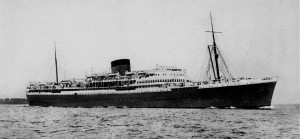
Like many people in their early to mid-twenties, I am still struggling to figure out who I am. One day not too long ago, I was told that I was acting “just like my father.” Ah yes, the age-old phrase that was said to me when I was a child (and typically when I was misbehaving). This time, however, instead of shrugging off the comparison as I typically would, I decided to dig a bit deeper. If I act just like my father, then maybe I am destined to be like my father…
My dad is a traveler. In his twenties, he was a member of the U.S. Merchant Marine, and since then, he has been to every continent (minus Australia), and recently moved to Saudi Arabia for a work project. When I told my dad about my idea for this blog post he told me, “Well you know what? I was always told that I was like my father!”
I only met my grandfather, Richard Archibald Brown, two or three times before he passed away when I was seven years old. Because of this, he has always remained a bit of a mystery to me, and he has become one of the main focuses in my personal research. Richard ran away from home when he was fourteen, and since he spent the next thirty-five to forty years of his life on the ocean with private merchant companies and the Merchant Marine, the only way I can really track him down is through ship manifest records and his medal records from World War II. So far, I have found my grandfather in Mozambique, London, Marseilles, New Orleans, Japan, Hawaii, and just about everywhere in between. I knew that my grandfather had a very active nautical career, but I had no idea that he was even more of a seadog and a traveler than my dad.
This got me thinking: If I am like my father, and my father is like his father … was my grandfather like my great-grandfather? Frederick Archibald Brown, my great-grandfather, left England in his mid- to late-twenties to move to Mexico, where he later married and had a family. Why? Well, that is still on my “research to-do list.” No matter the reason, my great-grandfather still decided to make a 5,000 mile journey to a new country and to start a new life for himself and his future family.
I suppose that the common theme here is that I come from a family of travelers. So far, the biggest trip I have ever made was from a small town in New Jersey to Boston. Although this trip is certainly nothing to scoff at, I feel as if I may need to step up my travel game in order to get on par with my ancestors. If traveling was what made past generations of my family happy, maybe it’s something I should try, too.
I guess I should start packing my bags.
Your post made me chuckle, Laura. There appears to have been a kind of restlessness in several lines of my family that holds to this day. Every generation of all the lines I’ve been able to research so far makes a major move at least once, and sometimes several times. There’s a trail of us across the Continent that involves nearly every state, including AK & HI, and parts of Canada. That doesn’t include the travels back and forth to visit relatives, often over long distances. No wonder the genealogies of our family are so challenging and riddled with errors! We not only move, we recycle names to that the same names appear in lines in different places! And as for like parent, like child thing, we have to plead guilty. I have cousins all over the place, and I have managed to relocate myself clear across the country– within a few hours drive of where my first immigrant ancestors lived on this continent!
A very interesting blog. I grew up not knowing my birth family trait. Well at 65 I learned what my ancestors were up to. Every branch, starting with the Mayflower did not stay put for more than 10 to 15 years before heading west. It took about 50 years to cross the USA. The family has managed to live in every state in the USA, and Canada. Fast forward to me – I’ve travel to almost every state (missing 5) , Canada and Mexico and Bahamas. Planing Europe in 2 years and I’ve moved 10 times in 8 years.
I enjoyed your post as it made me think about my own family traits. I am a firm believer that they often follow us through the generations.